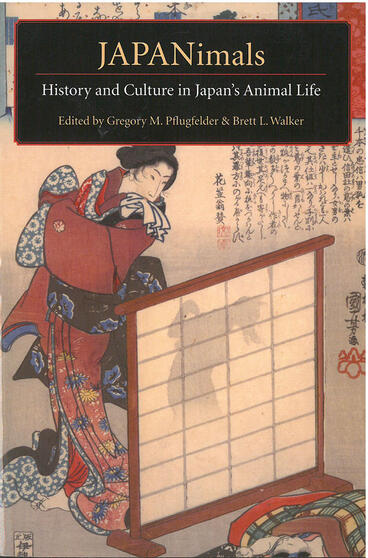JAPANimals
History and Culture in Japan’s Animal Life
Brings the cultural ubiquity of animals into sharp focus over questions of economy, nation, empire, and modernity
Description
From swift steeds to ritually slaughtered deer to symbolic serpents, nonhuman animals of every stripe have participated from the earliest of times in the construction of the cultural community that we know as Japan. Yet the historical accounts that have hitherto prevailed, claim the authors of this innovative volume, relegate our fellow animals to a silent and benign “nature” that lies beyond the realm of narrative and agency. What happens when we restore nonhuman creatures to the field of historical vision?This book challenges many of the fundamental assumptions that have shaped contemporary scholarship on Japan, engaging from new perspectives questions of economic growth, isolation from and interaction with the outside world, the tools of conquest and empire, and the character of modernity. Essay by essay, this provocative collection compels readers to acknowledge the diversity of living beings who exist at the ragged edges of our human, as well as our historical, horizons.
Gregory M. Pflugfelder is Associate Professor of East Asian Languages and Cultures at Columbia University. He is the author of Politics and the Kitchen (in Japanese, 1986) and Cartographies of Desire (1999).Brett L. Walke
Reviews
"JAPANimals exemplifies the intellectual ferment at the intersection of animal studies, environment research, and human history. The insightful introduction and nine essays, each on a separate species, engage us at every level. Religious and literary parables of nine-colored deer and serpent paramours meet with ecological studies of wild boar and climate change. Standard political and economic narratives are enriched, and sometimes overturned, by horses revealing the colonial nature of Hideyoshi's unification campaign, by exotic birds traded during the Tokugawa era, by dogs accompanying their European masters to Meiji Japan, and by captured wildlife displayed as the spoils of empire. Through its insistent attention to Japan's nonhuman majority from bugs to whales, JAPANimals delights, informs, and challenges our current species-centric approach to history."—Julia Adeney Thomas, University of Notre Dame
"In their edited volume on animal-human relationships, Pflugfelder and Walker significantly expand the horizon of Japanese studies. All essays collected here boldly challenge the way in which we have conceived Japanese history, literature, religion, art, and society and demonstrate numerous new possibilities to link these fields to ecology, geopolitics, and earth science. JAPANimals not only opens our eyes to Japan’s animal culture but provides a fresh perspective to better understand Japanese culture as a whole vis-à-vis other Asian cultures and that of the West."—Ryuichi Abe, Harvard University
"This bounteous but disquieting book shows us a variety of marvelous beasts getting snared not only by human nets but also within human conceptions. Animals get drawn up into how being ‘civilized' is represented, especially once Japan enters into power tangles with the West. Part of the beauty of beasts, however, lies in how they resist being fitted too easily within the ‘material' culture we humans assume we can totally control. Ironies abound. Via fascinating accounts of human interactions with deer, dogs, boars, birds, whales, and other fauna, this splendid book also subtly explores the ethical problem, expressed earlier in Japan's history but newly resurgent today, of our materializing of the nonhuman animal."—William R. LaFleur, University of Pennsylvania

